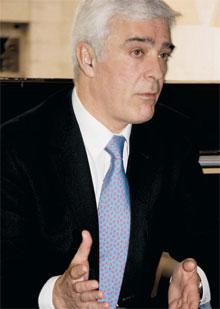Ignacio Machetti: General Manager of the Spanish Insurance Compensation ConsortiumFINANCIAL
Ignacio Machetti was born in Barcelona in 1959.
He is an economist and insurance actuary.
He has been a member of the government organization for insurance inspectors (Cuerpo de Inspectores de Seguros del Estado) since 1984.
He has held various positions in the General Manager of Insurance and Pension Funds (DGSFP), where he was Deputy Director-General of the Inspectorate from 1997 to 2001, and in the Insurance Compensation Consortium, where he has held the post of General Manager since January, 2001.
"Credit insurance is experiencing a recovery" The restricted supply of credit to the economy and the disproportionate increase in the claims burden for credit insurance have been two of the adverse consequences brought about by the financial crisis. With regard to credit insurance, which is intended to guarantee collection of payment when goods are sold to third parties, the insurers in this branch sought assistance from the government through the insurance business association (UNESPA - Spanish Union of Insurance and Reinsurance Institutions). This aid is based on a limited-term agreement with the Insurance Compensation Consortium. In this interview, we learn about the details of the measures adopted, while opinion suggests that the credit insurance branch is expecting economic activity to recover in the near future.
Historically speaking, which functions has the
Insurance Compensation Consortium (CCS) developed
for credit insurance?
We have passed through several different phases
in this area, all of them related to export credit
insurance (until the Reinsurance Agreement that
was launched last year). To summarize the most
important developments: between 1969 and 1970,
the CCS took direct charge of export risks
designated as "political and extraordinary" during
the period when it was handling the reinsurance
of the commercial risks as well. This business
was taken on by an entity known as the "Compañía
Española de Seguros de Crédito y Caución" "Spanish
Credit and Guarantee Insurance Company".
During a short period of a few months in 1970,
the CCS even took on direct responsibility for
commercial risks until the formation of CESCE
(Compañía Española de Seguros de Crédito a la
Exportación - Spanish Export Credit Insurance
Company). From 1971 onwards, CESCE took over
direct cover for all export credit risks, although
it did so for the account of the State in respect of
political risks, and it reinsured commercial risks
with the Consortium. In 1990, the Consortium
stopped reinsuring commercial risks, leaving it
with the sole function (which it still retains) of
managing funds for the purpose of export credit
insurance on behalf of the State - that is to say,
a treasury function.
It is only now that consideration has been given
to intervention by the Consortium as a reinsurer
for all types of credit insurance, including domestic;
this has been occasioned by the economic
crisis and only on a temporary basis.
When reinsurers came to the conclusion that
they were not prepared to continue taking losses,
why was the Insurance Compensation Consortium
considered as a source of assistance for
credit insurance in Spain?
When the Spanish credit insurers identified restrictions in the reinsurance market at the time of
the 2009 renewals, they voiced a unanimous
request. This was triggered by the increase in
defaults due to the economic crisis. Several initiatives
were emerging in Europe specifically in
France, through the Caisse Centrale de Rèassurances
(CCR, Central Reinsurance Fund), the public reinsurer;
and in Spain, thoughts turned to the Consortium,
whose efficiency as a complement to the
private sector was already well proven.
This did not please the reinsurance market at
first, due to fears that such an intervention would
distort competition. But the market took a more
relaxed approach once the terms of the Consortium's
participation were laid down, including in
particular its objective of remaining neutral in
the market. Time has shown that this objective
was achieved.
Which model was followed in Europe to assist
credit insurance?
As we know, support measures have been introduced
in various countries but according to the
insurers, they lack the flexibility and efficiency of
the measures implemented here in Spain. The
case which has been the subject of most analysis is that of France, where measures of this sort were
apparently proposed for individual transactions
affected by a reduction in guarantees; the CCR
provided complementary cover, offering as much
again as was guaranteed by the private insurer.
The intervention by the Consortium as a reinsurer for all types of credit insurance, including domestic, has been occasioned by the economic crisis and only on a temporary basis
Apart from the insurance sector, which other
activities are benefiting from the measures that
have been introduced?
Generally speaking, all sectors of the economy
that avail themselves of credit insurance and use
it to guarantee that their business transactions
reach a successful conclusion. Much use is made
of credit insurance in Spain. In fact, the Consortium's
participation was not primarily targeted
at the insurance sector as such; however, the
sector benefited because complementing its
capacity enabled it not to exclude business sectors
or individual operators from guarantees for reasons
other than the high risk of debtor default.
In other words, the objective was that any restrictions
on cover would be based solely on an analysis
of the risk, not on a lack of capacity.
How was this aid formulated in law, and how
was it actually put into practice?
The Consortium's legal statutes stipulate and
permanently regulate a number of its functions,
but they also contain a precept which allows the
Consortium to provide cover of other types on the
basis of decisions adopted by a qualified majority
of its Administrative Board. Such cases are always
subject to the requirements that they must conform
to the public interest and must accord with
market circumstances. This is an arrangement
for use in exceptional cases and one which gives
the Consortium a high degree of flexibility, but
the general principle is that of legitimacy, so
interventions made in this way must be temporary
or must culminate in an amendment to the law.
On this occasion, conformance with the public
interest was also endorsed by Royal Decree,
according to Law 3/2009 on Urgent Measures
Related to the Development of the Economic
Situation, which explicitly authorized us to accept
reinsurance in this branch subject to specified
conditions.
In practice, the arrangements were implemented
in accordance with a Reinsurance Agreement
entered into by the Consortium and UNESPA
(Spanish Union of Insurance and Reinsurance
Institutions), initially valid for a temporary period;
insurers operating in Spain were able to sign up
to this Agreement on a voluntary basis and with
one exception, all of them have done so.
What did this entail?
The Consortium's contribution was designed to
provide reinsurance in two ways: proportional
participation in quota share (the basic method of
reinsurance in this branch) with a minimum and
a maximum, and under the same terms as the
other reinsurers " i.e. entirely in line with market
conditions " and in addition, stop-loss protection
to guarantee a percentage of the aggregate excess
of claims ranging between 85% and 130% of
premiums. To ensure financial equilibrium for this
second arrangement, which is not a customary
method in the branch, clauses were incorporated
into the Agreement allowing the contributions
made by the Consortium during the validity period
of the Agreement to be recovered by it over time.
How did the specialist insurance sector welcome
the news that it could count on support and
capacity from the CCS?
Given that the support was requested by the sector
itself, of course, the reaction was good. The insurers
thanked the Ministry of Economy and Finance
with relief for this favorable arrangement because
" albeit subject to restrictions " it allowed the
sector to retain a very important part of its portfolio.
Once the Agreement was signed, numerous companies
gave it their immediate and full support.
All operators on the Spanish market signed up to
it except for one, perhaps because the firm in
question was already using umbrella reinsurance
programs from its parent company.
What estimate can be made of the cost of this
system for offering capacity to the insurance
industry? Have many losses been incurred?
The aim here was to contribute capacity on a
basis of neutral financing, without undesirable
interference in the reinsurance market. Obviously,
the Consortium's participation in quota share
treaties costs exactly the same as the rest of
capacity available on the market. As regards nonproportional
protection, the effect should be
neutral, i.e. its cost must also be similar in the
medium term. The Consortium's intervention
was more a matter of convenience than cost.
The real use of capacity under the terms of the
Agreement has not reached the envisaged maximum,
and is currently running at a figure of
about EUR 80 million (net of premiums). I would not use the term "losses", since the Agreement
made provision for them to be recovered and
charged to current earnings over the next five
years. Only one firm that signed up to the Agreement
did not need to use the stop-loss cover in
2009.
The Consortium's reinsurance capacity was designed as a proportional participation in quota share at market conditions and a stop-loss between 85% and 130% of premiums
We know which companies have made use of
the Agreement, but do we know the branches
where they used it?
Basically in all of them. I have already mentioned
that much use of credit insurance is made in
Spain, both for foreign transactions (between 80%
and 90% of our exports are sent to Europe) and
for domestic business. It has to be said that
construction cover was one of the areas where
most problems arose, but the fact is that all the
branches have benefited because they have been
able to cover more risks.
The return to normal conditions has been faster than forecast, as all operators have already decided not to participate in 2010, with one single exception
How long will the Reinsurance Agreement remain
in force?
An initial maximum period of three years was stipulated,
after which it will be necessary to revise
the Agreement " either in order to terminate it, or
to amend its terms. But it seems that the return to
normal conditions has been faster than was forecast,
because all of the operators have already decided
not to participate in 2010, with one single exception.
So for the bulk of the market, the duration of the
measure has been cut down to one year. From now
on, once this support has been utilized and cover
has effectively been transferred, the Agreement
gives the Consortium a period of five years to stabilize
its joint result by participating in the technical
accounts of the companies in this branch.
So, credit insurance is recovering and companies
seem more ready to enter into contracts. How has this development been influenced by the
Government's intervention through the CCS?
The crisis is not over yet. Restrictions on credit
insurance transactions in respect of conditions
as well as risk selection criteria have enabled
companies to stay in the black. Moreover, companies
are already considering the expediency of
a return to more permissive underwriting policies.
In short, this public intervention has made it
possible for restrictions and adjustments to be
governed by strictly technical criteria, while keeping
the portfolio of insureds above critical mass;
otherwise, there would have been no recovery,
or at least not such a speedy one.
How would you describe the current situation in
the credit branch in Spain?
An exhaustive analysis is not easy. Credit insurance
is essentially a product that originates
from this side of the Atlantic, from Europe, and
it has a particularly high level of penetration in
Spain; that is why we have the world's second
largest group of credit insurers here. The real
experts should be asked for their view of the
situation. Outside of our country, I believe that
the crisis has claimed victims among insurers,
and there have also been some exits from the
reinsurance markets. The Spanish market has
enjoyed good health. It is standing up well to the
pressure, but it was prepared for this: credit
insurance not only foresaw the crisis, but has
also been able to begin its recovery before other
sectors of the economy.
Notwithstanding all of this, and now that the
Consortium's intervention is practically at an
end, the companies still have much to do: we
are not even in the same situation as we were
before the crisis.
Credit insurance not only foresaw the crisis but has also began its recovery before other sectors of the economy
The Insurance Compensation Consortium: function and mission
The Insurance Compensation Consortium (CCS) is a public corporate entity with its own legal identity which acts as a service provider to the Spanish insurance sector, into which it is fully integrated. It dates back to 1941 when it was constituted on a temporary basis to provide compensation in response to problems that originated during the Spanish Civil War of 1936.
The Consortium's functions have changed and become more extensive over the years, as have its Legal Statutes, which are subject to the same legislation as is in force for private insurance. The CCS has wide-ranging experience and is highly specialized in the functions entrusted to it, which include providing cover for extraordinary risks such as natural risks and terrorist attacks. covered by an insurance contract. It also carries out underwriting for motor insurance when it is impossible or impractical for the market to do so, and it provides accident indemnity in cases where the driver is unknown or is driving without insurance. Its reinsurance activities complement the agricultural insurance system and it plays a similar part in credit insurance, as we have seen. The CCS is also assigned the function of liquidator for insurance companies which cease to be viable.






